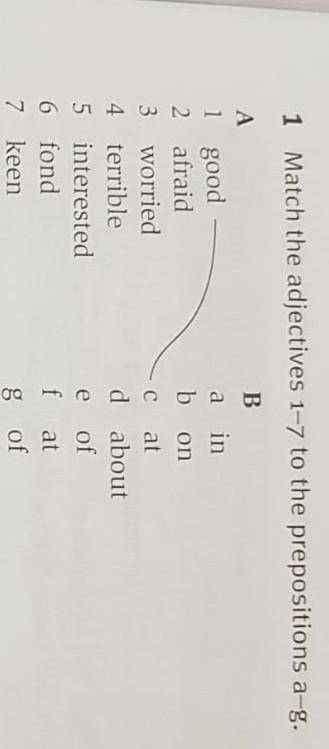1 задание на фотке
2 Complete the sentences with an adjective and preposition from exercise 1 so that they mean the same as the sentence above.
1 At school, Tom Cruise did well at sports. At school, Tom Cruise was good at sports.
2 Other kids laughed at Bill Gates because his only interest was computers.
Other kids laughed at Bill Gates because he was only
computers.
3 Kurt Cobain didn't like school, but he really liked his
art teacher.
Kurt Cobain didn't like school, but he was
his art teacher.
4 At his school, Tiger Woods was frightened by the other boys.
At his school, Tiger Woods was
the other boys.
5 Winston Churchill hated school, but he loved reading. Winston Churchill hated school, but he was very
reading.

Другие вопросы по теме Английский язык
Популярные вопросы
- Героическая былина это Илья Муромец и соловей разбойник...
3 - 3. Өлеңді оқып, тақырыбы мен Идеясын анықтаңыз. үзіндінің маңыздылығына...
3 - Определите ВИД ТОПОСА В человеке всё должно быть прекрасно: и...
2 - на прямой отмечены два натуральных числа. одно из них обозначено....
1 - 3.3. Определить точку росы, если относительная влажность воздуха...
3 - К психологу обратился за консультацией восьмиклассник Витя М....
3 - Какие объемы 60 % серной кислоты и воды потребуются для приготовления...
1 - Вставить слова в 1 и 2 текст...
2 - Инженерная графика, построить точки по координатам, 19 вариант...
1 - Сочинение по музыке ,,разлука с родиной Рахманинов...
2
Explanation: We are looking for an adjective and preposition to replace the phrase "did well". The preposition should convey the idea of being proficient in something. From exercise 1, we can see the adjective "good" and the preposition "at". So, we can use "good at" to mean the same as "did well at".
2. Other kids laughed at Bill Gates because his only interest was computers.
Other kids laughed at Bill Gates because he was only interested in computers.
Explanation: We need to replace the phrase "his only interest" with an adjective and preposition. The preposition should convey the idea of being interested in something. From exercise 1, we can see the adjective "interested" and the preposition "in". So, we can use "interested in" to mean the same as "his only interest".
3. Kurt Cobain didn't like school, but he really liked his art teacher.
Kurt Cobain didn't like school, but he was fond of his art teacher.
Explanation: We need to replace the phrase "he really liked" with an adjective and preposition. The preposition should convey the idea of having positive feelings towards someone. From exercise 1, we can see the adjective "fond" and the preposition "of". So, we can use "fond of" to mean the same as "he really liked".
4. At his school, Tiger Woods was frightened by the other boys.
At his school, Tiger Woods was scared of the other boys.
Explanation: We need to replace the phrase "was frightened by" with an adjective and preposition. The preposition should convey the idea of being scared or afraid. From exercise 1, we can see the adjective "scared" and the preposition "of". So, we can use "scared of" to mean the same as "was frightened by".
5. Winston Churchill hated school, but he loved reading.
Winston Churchill hated school, but he was very passionate about reading.
Explanation: We need to replace the phrase "he loved" with an adjective and preposition. The preposition should convey the idea of having strong emotions towards something. From exercise 1, we can see the adjective "passionate" and the preposition "about". So, we can use "passionate about" to mean the same as "he loved".